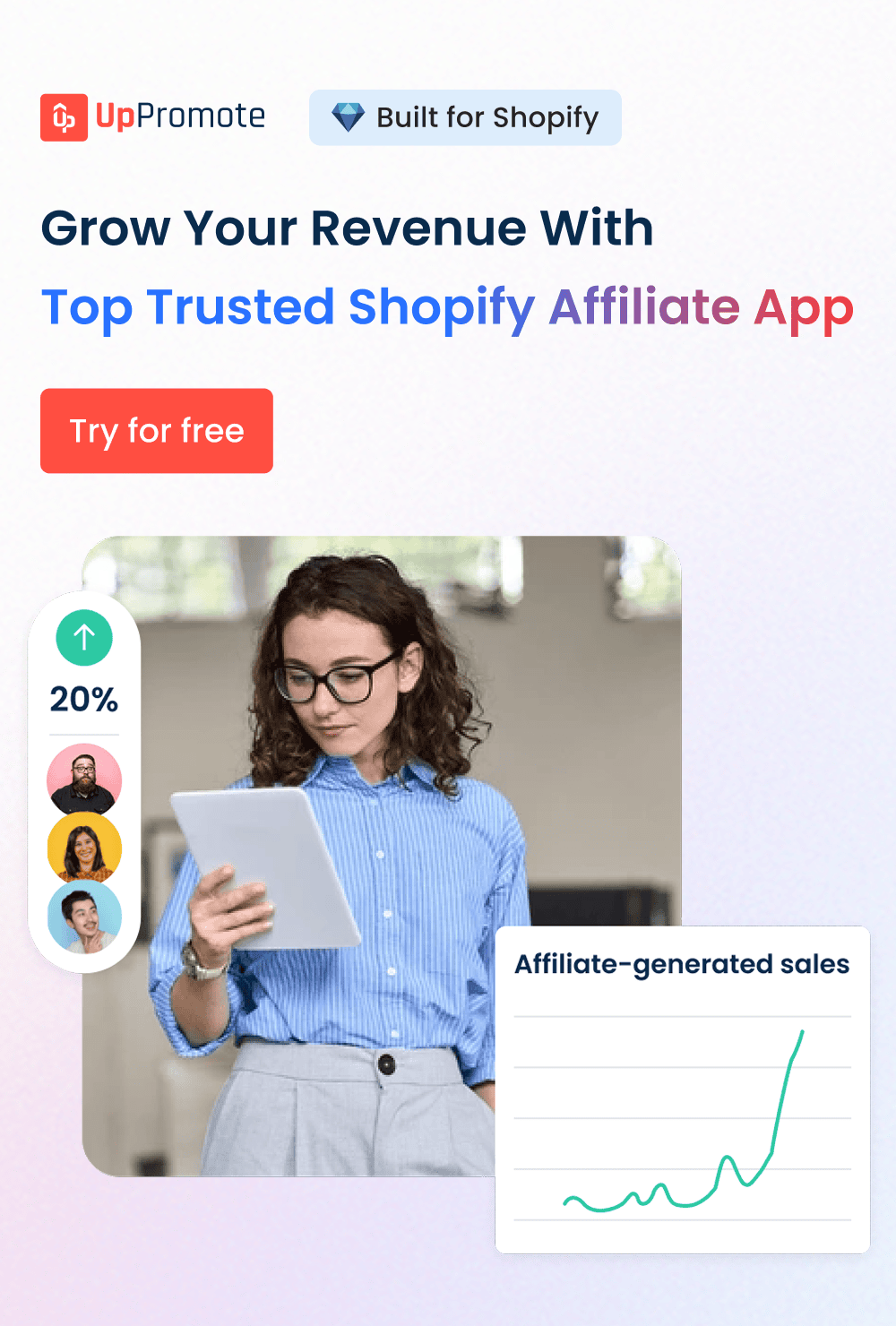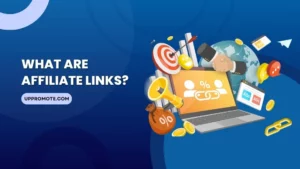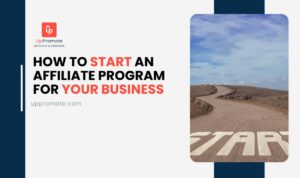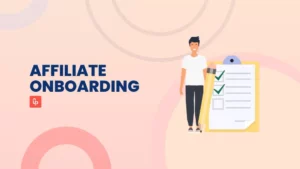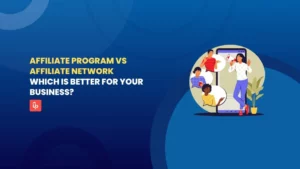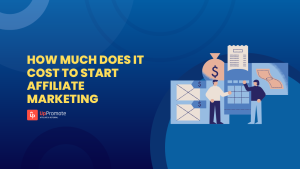Despite being around for over three decades, some people still wonder what is an affiliate partner.
In a nutshell, the term defines a mutually beneficial relationship, mainly between a company and an independent marketer. It’s a crucial element of a multi-billion-dollar industry, growing at an unprecedented 47% between 2018 and 2021.
Join us in exploring and appreciating what (or who) an affiliate partner is, what a partnership looks like, how to establish such a relationship, and why it’s great for your business.
Ready?
What is an Affiliate Partner?
An affiliate partner is anyone forming a mutually beneficial relationship with a business (i.e., manufacturer, retailer, or any company) to promote the latter’s offerings in exchange for a monetary reward (i.e., commission and bonuses).
Affiliate partners can be anyone. Hence, you might think they are like a company’s marketing professionals.
Not quite.
Although their goal is identical (i.e., promote as many products to generate more sales for the business), they differ in the “nature” of the business connection or “partnership.”
An affiliate partner is essential in the marketing department because merchants can rely on their reach, influence, and expertise to sell products to the intended audience.
Affiliate marketing is often CPA, with sales as the typical action. Thus, merchants only pay for the guaranteed converted sales. It cuts costs on advertising. The price of which is increasing but with little to no improvement in conversions.
Three Main Pillars of Affiliate Marketing Partnerships

Defining what is an affiliate partner is easier by recognizing and appreciating the three “actors” or “pillars” of such a relationship. You won’t have an affiliate partnership if one of these entities is missing.
The Merchant
Retailers. Vendors. Traders. Sellers. Merchants have various names. However, they share only one thing – sell products to end-users. These are businesses offering products and services catering to different consumer needs.
Without the merchant, affiliate partnerships won’t exist because there’s no product to promote and sell. Hence, affiliates cannot earn commissions, and consumers cannot access innovative products or services.
Looking at the merchant-affiliate-customer triangle, merchants are the suppliers where products originate (although you can argue that’s a manufacturer’s job).
A merchant also creates the affiliate program, leveraging affiliates’ existing connections and reach to improve brand awareness and generate revenues.
The Affiliate
The merchant’s “frontman.” Affiliates are the people, groups, or organizations you outsource to promote your products or services.
Affiliate partners can be anyone with a knack for encouraging or persuading others into trying a product. They could be a content creator (i.e., bloggers, YouTubers, or TikTokers), podcasters, trainers, consultants, educators, or other businesses with an expansive audience.
Would it surprise you that loyal customers can also be affiliate partners? So do coupon sites and CPC advertisers.
Affiliates don’t push or shove products into audiences’ lives. Instead, they create situations or instances where people realize they need such products or services. They recommend or suggest merchant offerings, hoping audiences will consider.
That’s subtle persuasion or influence – a craft vital to any affiliate. Unsurprisingly, we call them influencers.
Did you know nearly half have 10,000 to 100,000 followers on social platforms? Although their reach might seem limited, forming a partnership is easier and more affordable. Their engagement rates across social media channels are also higher than mega influencers (3.86% vs. 1.21% on Instagram, 1.64% vs. 0.37% on YouTube, and 17.96% vs. 4.96% on TikTok).
And get this.
Micro influencer partnerships guarantee at least 20% more conversions than influencers with 100,000 to a million followers. Moreover, four of five consumers (82%) trust micro influencers’ recommendations.
These are impressive numbers for affiliates (influencers) with less than a hundred thousand followers. And that translates to more business growth opportunities.
The Customer
They say three’s a crowd, but you cannot form a stable structure with only two “pillars.” Hence, the third element – the customer – is equally crucial.
Businesses cannot exist without customers, and affiliates cannot earn a commission if their audiences don’t become customers. Unsurprisingly, a robust customer base forms the “stabilizing leg” of the tripod we call affiliate marketing.
Customers are anyone, even business owners and affiliates. We need something from others and are willing to exchange cash, cryptocurrency, or credit for it.
Unfortunately, individuality runs supreme among customers. They have peculiarities that affiliates must discover to create meaningful content.
For example, although everyone needs food, some prefer vegetarian options while others are self-confessed carnivores. Promoting a vegan diet plan doesn’t make sense to meat-lovers, but it does among vegans.
Why Should You Build an Affiliate Partner Program?

We mentioned that four of five brands have affiliate programs. We forgot to mention over 100,000 companies (about 107,000 and counting) worldwide hire affiliates.
And here’s a mind-boggling fact!
The affiliate marketing industry could breach the $40 billion-mark by the turn of the 21st-century’s third decade.
And there’re more to why you should have an affiliate mechanism built into your business:
- It’s cost-effective
- Promotes continuous business growth
- Leverages affiliates’ extensive reach
- Fosters brand awareness, loyalty, and growth
It’s cost-effective
Affiliate marketing is more cost-effective than conventional marketing, where businesses have paid employees promoting and marketing their products. Even if there’s no new business entering the company, employers must pay workers.
Companies only “pay” affiliates when referrals become verified sales. No “sale,” no commission.
Promotes continuous business growth
Company executives can earmark traditional marketing cost-savings to other critical business processes. For example, they could increase research & development budgets or improve supply management.
Leverages affiliates’ extensive reach
For example, nano social media influencers can have at least a thousand followers, while mega influencers can have millions of subscribers, followers, or audiences.
Imagine converting these social media followers into customers. Your company will hit the big time.
Although companies can “reach” these potential clients, it’s less cost-effective. It’s worth pointing out that social media users “trust” influencers. Hence, forming strategic partnerships with the latter leverages their audience base.
Fosters brand awareness, loyalty, and growth
Tapping into affiliates’ impressive reach empowers you to grow brand awareness and foster brand loyalty.
Let’s face it.
Most consumers are brand-centric. They only use products from brands they trust.
And if influencers and affiliates can build a credible story around your brand, you can enjoy the same loyalty as leading brands.
Affiliates and influencers’ target audience can become your lifetime customers.
But that’s not all.
Expanding your client base is easier with loyal customers vouching for you. Word-of-mouth marketing becomes a natural strategy, you don’t have to tell customers to spread the word.
What to Look for in a Great Affiliate Partner?

Successful partnerships require at least two like-minded entities recognizing and playing their respective roles. So, what qualities should you look for in potential affiliate partners?
For businesses
Niche specificity is a parameter worth considering. You’ll want an affiliate knowledgeable about your industry.
For instance, you’ll need health and fitness influencers and affiliates to promote nutritional supplements, diet plans, health technologies, and related items.
And since you want to sell products to as many people as possible, you’ll need potential partners with an extensive audience base. You can start with a nano influencer with at least a thousand followers. But if you have the budget, a mega influencer will be nice.
Inherent in these affiliate partner attributes is digital presence. The website or blog should be operational for at least several months before joining the program. Ideally, you’ll want the platform to receive steady traffic. Otherwise, few people will visit your website (if at all).
You’ll also want affiliates who create meaningful and quality content. After all, one of this partnership’s goals is to grow brand awareness and develop loyalty. Conveying an image of trustworthiness would be challenging with mediocre promotional content.
And if the partner has a social media account, you’ll want to check their engagement. This metric underscores how “active” (i.e., comments, shares, and likes) the affiliate’s audiences are and could offer insights into brand campaign effectiveness.
For affiliates
Affiliates seeking a partnership with a merchant must consider the company’s reputation. Although not always easy, affiliates can check trustworthiness management platforms, such as TrustPilot.
The company’s product offerings should also undergo scrutiny. Are these items beneficial to audiences? If so, what benefits can people derive from such offerings? Will recommending these services or products not undermine the affiliate’s credibility?
Influencers and affiliates must examine and analyze the merchant’s commission system. Do they get a commission when a referral visits the business website, or must the referral buy a product to earn a share? How does the average affiliate paycheck compare to other platforms?
Support resources are also crucial parameters for affiliates to consider. Are there training, an affiliate team, promotional materials, and other leads-boosting resources?
How about the merchant’s dos’ and don’ts (i.e., postings) and payout terms? Must affiliates wait several months to receive commissions? Does the business pay affiliates through PayPal only or offer other payment options?
Key Tips to Establish Successful Affiliate Partnerships

A successful affiliate marketing partnership requires a party to initiate or make the first move. Although most affiliates will join brands to make money leveraging their audience reach, it’s not uncommon for companies to establish the relationship. Here are some tricks to ace this task.
Contact with your potential affiliate partners
Most businesses partner with affiliate networks, leveraging the latter’s established and proven systems. These are third-party platforms (i.e., Amazon Associates, ClickBank, and ShareASale) where merchants can showcase their products without worrying about marketing.
Why?
Affiliate marketing networks have managers overseeing affiliate acquisition, training, marketing, and performance. They have the tools to vet aspiring affiliate marketers, ensuring you only get highly active and productive affiliate partners.
Affiliate platforms also have resources to support marketing campaigns. Most have affiliate teams aiding and guiding affiliates in promotions.
Unfortunately, you’ll pay these “third-parties” for their services and infrastructure. The good news? The cost is only a fraction of the commission rate you give to affiliates.
So, we recommend doing your research about these third-party affiliate platforms to ascertain their trustworthiness, services, costs, and other details.
And if you’re ready to contact them, give the program’s affiliate manager a phone call. Be brief yet comprehensive, informing them about your business, offerings, and proposals. Keep the phone call short but “juicy,” sending the affiliate network the proposal details after the call.
There’s a good chance the affiliate manager forgot your proposal because of other work commitments. So, make a follow-up call after a few days.
Alternatively, email the affiliate manager (or whoever’s in charge) about your proposal. Don’t be disheartened if you don’t get a reply for several days (or weeks). Keep sending them emails until you’re in the affiliate program (or receive a convincing “no”).
Brands (even affiliate platforms) have social media profiles. You can reach them through this channel. Be cautious, and plan your approach to avoid appearing “spammy.” An excellent solution would be to contact them with your company’s social media page.
Note these approaches are like “cold-calling,” and not many like that. So, focus on how an affiliate partnership will benefit them.
Boost your networking by joining events

Understanding what is an affiliate partner requires appreciating its most fundamental tenet – connections. And that brings us to the second tip for establishing successful partnerships between businesses and affiliates.
Although phone calls, emails, and social media are good strategies for establishing connections, these methods are “cold.” A “warmer” approach is to join industry events.
These activities can be in-person or online (virtual). Regardless of delivery, networking events allow brands to have “light” yet meaningful conversations with potential affiliate partners, including affiliate managers.
We still recommend researching such gatherings, including other participants (i.e., affiliate managers, bloggers, podcasters, vloggers, and other influencers).
Plan your approach, such as framing a “sales pitch” (without looking too pushy) about why your brand is an excellent fit for a partnership.
Be yourself at the affair and try to mingle with as many potential affiliates and affiliate managers as possible. Remember, business-affiliate partnerships aren’t a one-off thing. These relationships should endure.
Wait a few days before ringing some of the contacts you made at the event. They should remember you if your approach was successful.
These contacts might reject your proposal. In such instances, thank them for the chance to meet in person. Lastly, politely ask for referrals. They might know someone interested to become an affiliate partner.
Collaborate with influencers to grow your brand awareness

New contacts might refer you to a social media influencer. Or, you could meet social media personalities at the event. Either way, these affiliates can offer excellent affiliate partnership opportunities.
Influencers have their followers’ respect and trust. Their viewpoints and opinions matter, regardless of what the rest of the world thinks.
Hence, partnering with influencers can substantially boost a partner brand’s image. Moreover, it increases awareness of the company, its vision, and offerings.
There’s a catch, though.
Collaborating with influencers to boost brand awareness can be costly, especially with mega influencers.
For example, leveraging Cristiano Ronaldo’s 613 million Instagram followers will cost you $1.6 million per social media post. And if Ronaldo “commands” his loyal followers to buy your product in a hundred posts, that’s $160 million off your budget.
Unsurprisingly, only big-name brands (i.e., Nike, Abbott, Tag Heuer, and Herbalife) would dare approach Ronaldo’s manager for a social media collaboration.
If you don’t have a huge budget for a mega or macro influencer, you can collaborate with nano and micro influencers to boost brand awareness.
Most businesses offer a commission for influencers, while some pay them after each social media post, blog, webinar, podcast, or video.
Alternatively, you can create a co-branded landing page – your product and the influencer on each website’s backpages. Go a step further by personalizing the landing page’s URL.
Work with compatible and big-name brands
Here’s our last tip to establish a successful affiliate sales & marketing partnership.
It might seem “unusual,” but this trick works. The key is to highlight your business’s strengths and how a big-name brand can benefit from it.
For example, suppose you own a unique payment processing system guaranteeing secure transactions at lower fees than competitors. You could partner with leading merchants and organizations to use your platform and generate additional income.
You can incentivize members and affiliates by offering them a cashback for every purchase they make from big-name brand partners.
Mutual benefit.
That’s the point!
And if we know big-name brands, they’ll grab every opportunity to increase revenues, wow their customers with unique experiences, and grow the business.
Negotiations can take time, but your efforts will pay huge dividends.
Typical Examples of Affiliate Partnership Programs
We know you will ask, “What does an affiliate partnership platform look like?” Check out these five examples.
Shopify
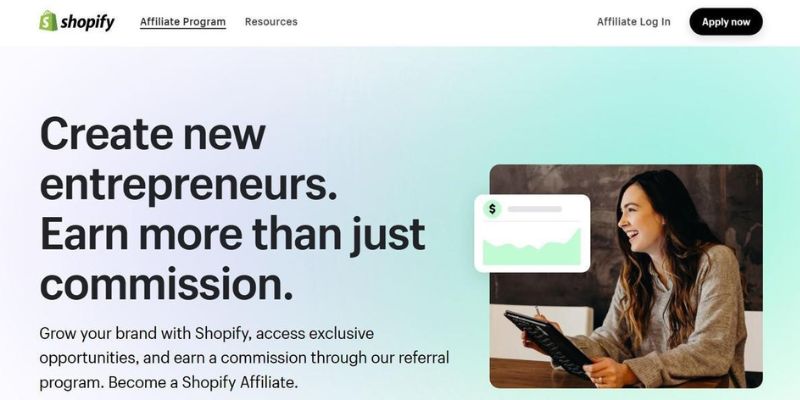
Shopify is worth considering if you’re thinking of a trustworthy partner to launch your business on almost any imaginable platform (i.e., website, social media, mobile devices, and conventional brick-and-mortar stores).
It could support a dropshipping business, offer excellent payment processing solutions, or build your company from the ground up.
Unsurprisingly, 1.75 million entrepreneurs use Shopify to sell high-quality products, while 3.76 million have Shopify-powered websites.
And get this!
Shopify-powered businesses drive 10% of the US’s e-commerce industry, and the platform accounts for about $444 billion in economic activity worldwide.
With these robust numbers, Shopify is a magnet for small enterprises and startups.
But how about its affiliate partnership?
Although we don’t have the exact figures, Shopify is a magnet for dedicated affiliates willing to become your partners. Its affiliate strategy is one of the best, too.
Shopify rewards affiliates with a 200% bounty for every referral signing up with a Shopify plan.
There’s a catch, though.
Referrals must stay with the plan for at least two months before Shopify releases the commission to the affiliate.
The good news? Referrals getting the $2,000 ShopifyPlus Plan should translate to a hefty $4,000 affiliate commission after two months.
How’s that for a passive income?!
- Commission: 200% single-tier
- Cookie Lifespan: 30 days
Amazon
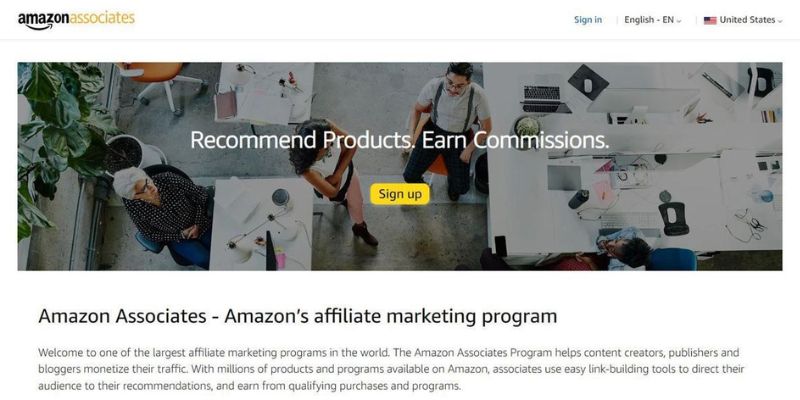
This Jeff Bezos brand requires no introductions. But what you might not know is that three of four merchants from nearly 10 million sellers on the platform find the partnership profitable.
And it gets crazier!
Two in three merchants find success after only 12 months with Amazon.
So, you could belong to these “winners” if you play your ace.
And you don’t even need to keep inventory because Amazon is a trustworthy dropshipping partner, too. Thanks to its Fulfillment by Amazon feature, you can excite customers and grow your brand without a physical store.
How about its affiliates?
Would it boggle your mind to learn Amazon has over 900,000 affiliate partners? And we haven’t touched its Influencer Program yet.
Hence, finding the right partner to promote your offerings shouldn’t be a problem with Amazon.
As mentioned, this platform has two promotions-oriented programs – affiliates and influencers. Don’t worry about the classification because these marketers still get identical commissions for posting affiliate links in respective channels.
- Commission: 1% to 20% product category-dependent
- Cookie Lifespan: 24 hours
eBay
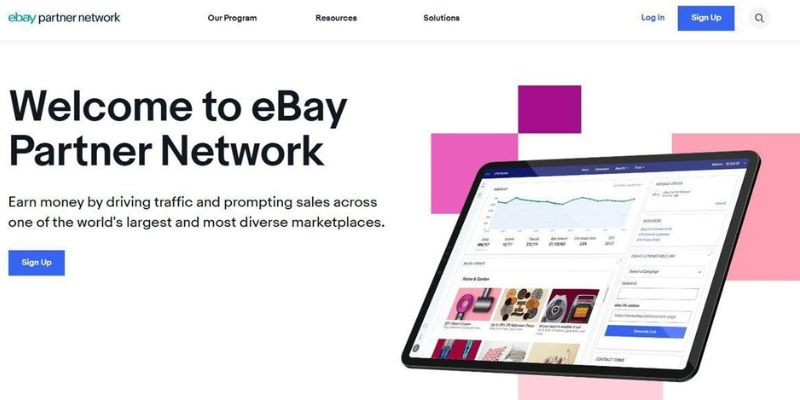
Pierre Omidyar might not be as popular as Jeff Bezos, but his creation boosted our understanding of an “open marketplace.” eBay has an ace Amazon doesn’t have.
Auction!
eBay allows ordinary people to sell pre-owned items without requiring a website or digital store. This platform hosts nearly two billion listings, with seven of ten products free to ship.
Unsurprisingly, over 130 million shoppers buy products on eBay, regardless of their location across 190 countries.
Sadly, eBay’s affiliate compensation structure is “less appealing” than Amazon’s.
Still, affiliate partners can leverage eBay’s other perks.
For instance, affiliates could promote products using various models (i.e., blogs, discount coupons, special deals, email marketing, rewards & loyalty programs, online comparison shopping, mobile apps, product listing ads, and social media sharing).
These “tools” should make an affiliate partner’s job easier and your goal of boosting brand awareness more realistic.
- Commission: 1% to 4%, single-tier category-dependent
- Cookie Lifespan: 24 hours
HubSpot
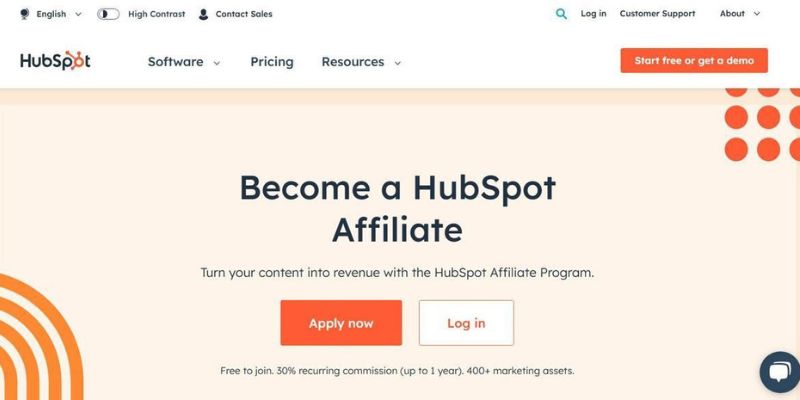
Shopify can help you launch your business, but you will still need HubSpot to manage your customer relationship programs. It’s an all-in-one platform for delivering the best customer experiences boosting brand loyalty.
HubSpot empowers business owners to manage their content, handle marketing activities, ensure sales, deliver exceptional customer service, and guarantee optimum business operations.
This platform isn’t only friendly to businesses but also affiliates.
Unlike other programs, HubSpot recognizes the challenges marketers face driving traffic and earning affiliate sales.
Hence, HubSpot rewards affiliates with a multi-tiered scheme – the more people affiliates drive to the platform and sign-up, the more “attractive” the commission and bonuses.
For instance, suppose an affiliate refers 500 people to HubSpot and half become customers. HubSpot recognizes such a marketer an “Elite Affiliate,” paying them more than the 30% baseline commission and other bonuses. They also enjoy a co-branded landing page.
While hitting 200+ monthly sales is challenging, converting three to four daily referrals should still be worth the 30% commission and cash bonus. HubSpot still rewards affiliates with a flat 30% if the output misses a hundred monthly sales.
Its 180-day cookie lifespan also blasts Amazon’s, eBay’s, and other programs. Impressive!
- Commission: Starts at 30%, multi-tiered, recurring for 12 months
- Cookie Lifespan: 180 days
SkillShare
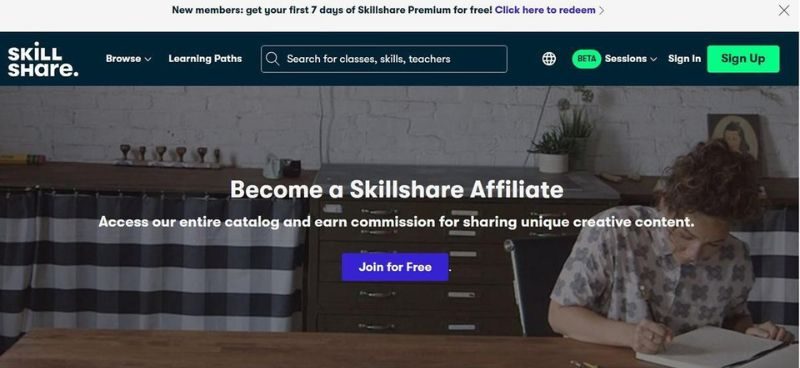
SkillShare’s partnership with affiliates is quite unique because it emphasizes niche alignment.
Because it’s an online learning platform, affiliates must demonstrate the desirable attributes of a teacher, trainer, educator, and related professions.
They don’t have to be these professionals, but their understanding of learning principles and educational technologies must be spot-on. Otherwise, persuading learning content developers, education technology creators, consultants, trainers, and educators won’t be convinced to try SkillShare’s services.
Like HubSpot, SkillShare understands affiliates’ concerns about blog or website ownership. So, it allows them to promote SkillShare on Facebook, Instagram, X, Pinterest, and email newsletters.
We can only imagine SkillShare’s number of partners in its affiliate program. With a generous commission and an industry-standard cookie window, becoming an affiliate partner with SkillShare makes sense.
- Commission: 40% single tier
- Cookie Lifespan: 30 days
FAQs
How much do affiliate partners make?
Affiliate platform partners can earn between 1% and 40% share of each sale, depending on the merchant and program. However, gaining more (i.e., 200%) is possible.
What is the difference between a channel partner and an affiliate partner?
An affiliate partner focuses more on promotional activities (getting people interested in a product they will actually buy later). Meanwhile, a channel partner (i.e., retailer, distributor, broker, or wholesaler) emphasizes selling on the brand’s or company’s behalf.
Conclusion
Identifying or describing an affiliate partner couldn’t be more straightforward than looking at it as two willing dance partners. Anyone willing to develop a mutually beneficial relationship with a brand or merchant, promoting its products for commissions or other rewards, can be an affiliate partner.
Such relationships require matching of interests and encouraging partners to do well. More importantly, businesses looking to start an affiliate strategy should prepare the infrastructure and organization to promote a successful partnership.
Boosting brand awareness, widening your reach, and ensuring a steady income stream is easy with dedicated and trustworthy partners affiliated with your organization.


